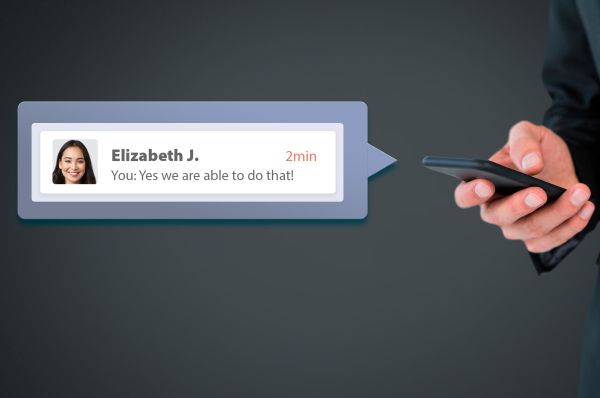
Business Text Messaging
Business text messaging has become an essential communication channel for small and medium sized companies looking to connect with their customers and prospects. By leveraging the power of business texting, organizations can quickly connect with their audiences in a way that is both cost-effective and convenient. In this post, we'll discuss the importance of using SMS as a strategic communications channel, explore its various benefits, explain how to choose the right software for your needs, provide best practices on sending messages effectively - all while measuring success along the way.
Table of Contents
- What is Business Text Messaging?
- Benefits of Business Text Messaging
- Best Practices for Business Text Messaging
- Measuring Success
- What is a professional text message?
- Conclusion
What is Business Text Messaging?
Business text messaging is a powerful communication channel for engaging customers and prospects, allowing companies to communicate quickly and effectively. Business text messaging is an efficient way to send messages, alerts, reminders, notifications, promotions, and more directly to the people who matter most. This article will explore the many benefits of using SMS technology as part of your marketing strategy.

Business text messaging has become increasingly popular in recent years due to its immediacy and convenience. Unlike email or phone calls, text messages are delivered instantly with no need for further action from the recipient, making it ideal for time-sensitive information such as appointment reminders or promotional offers that need to be seen right away. Another advantage of business text messaging is its cost effectiveness compared with other forms of communication like direct mail or radio advertising. Text messages can be sent out en masse at a fraction of the cost of traditional marketing methods while still reaching a large audience in a short amount of time. Businesses also benefit from using text messaging because it allows them to personalize their communications with customers by including names and other relevant details within each message they send out. This helps create an engaging experience that resonates better than generic emails or advertisements sent through other channels.
Finally, businesses can use analytics tools associated with their business texting software solutions to measure how successful their campaigns have been over time so they can adjust accordingly if needed. This helps ensure maximum return on investment on any money spent on business texting initiatives while allowing companies greater insight into customer preferences and behaviors, enabling them to tailor future campaigns according to these insights.
Key Takeaway
Business text messaging is a cost-effective and convenient way to communicate with customers and prospects, allowing businesses to send personalized messages, track results through analytics tools, and reach target audiences quickly xBenefits of Business Text Messaging
SMS provides an efficient, cost-effective way to reach customers and prospects quickly with personalized messages that can be tailored to individual needs, making it an ideal communication method for businesses to automate processes such as onboarding new employees or students, customer service inquiries, sales follow-up, marketing campaigns, and more.

xSales: Business text messaging offers an easy way for sales teams to stay in touch with leads throughout the buying process. By sending targeted messages at key points in the buyer’s journey—such as after they have viewed a product page or added items to their cart—businesses can increase conversion rates by up to 20%. Text messages are also ideal for providing timely updates on order status or shipping information.
Marketing: Business text messaging makes it easier than ever before for marketers to send promotional content directly into the hands of potential customers. With SMS campaigns, marketers can easily segment their audiences based on demographics or interests and tailor messages accordingly. Additionally, business texting enables companies to track response rates so they can adjust their strategies accordingly over time.
Customer Service: Texting is often faster than calling customer service lines and many people prefer receiving quick responses via text message rather than waiting on hold while trying to resolve an issue over the phone. Furthermore, business texting allows companies to provide automated responses when necessary without having staff members manually respond each time a customer contacts them via SMS. This helps ensure that all customers receive prompt attention regardless of how busy customer service representatives may be at any given moment in time.
Onboarding New Employees/Students: Onboarding new employees or students through business texting eliminates paperwork and reduces administrative costs associated with traditional methods of communication like emailing forms back and forth. Moreover, it ensures that everyone receives important information about policies, procedures, benefits packages, etc., quickly without having them wait days (or weeks) for paper documents to arrive in the mail.
Key Takeaway
Business text messaging offers a range of benefits, including increased sales conversions, targeted marketing campaigns, faster customer service responses, and streamlined onboarding processes. xBest Practices for Business Text Messaging
When it comes to best practices for business text messaging, the most important thing is to ensure that your messages are relevant and engaging. Just like you do with email, make sure that you’re sending messages that will be of interest or value to your target audience. Also consider the timing of when you’re sending out messages; try not to bombard people with too many texts at once or during peak hours such as late evenings or weekends when they may not have time or inclination to read them.
Another key factor in successful business texting is ensuring compliance with regulations such as GDPR (General Data Protection Regulation) and CAN-SPAM. This means making sure that all recipients have opted into receiving communications from you, as well as providing clear opt-out instructions should they wish to stop receiving texts from you at any point in time.
Writing effective business text messages requires careful consideration of both content and tone. Make sure your message is concise yet informative, friendly yet professional, and always proofread before sending. Avoid using overly promotional language or jargon – keep it simple so readers can quickly understand what you’re trying to say. Finally, consider adding visuals like images or videos if appropriate. This can help draw attention away from lengthy paragraphs of copy which may otherwise seem overwhelming on a small screen device like a smartphone.
Key Takeaway
Business text messaging is a powerful tool for businesses to reach customers and prospects, but it's important to ensure that messages are relevant, engaging, compliant with regulations, and well-written. It's important to track open rates on sent campaigns, click-through rates on links included within texts, unsubscribe requests, and AB testing. xMeasuring success
By following best practices for business text messaging, you can ensure that your campaigns are successful and engaging to customers. The next step is measuring the success of those campaigns to determine their effectiveness. Track open rates on sent campaigns so you know how many people actually opened up your message versus how many were sent out initially; measure click-through rates on links included within texts; monitor unsubscribe requests; use A/B testing where possible etc. All these metrics will give valuable insights into how well received each campaign was by its intended audience, allowing organizations to adjust future strategies accordingly if needed. Another metric you should track when measuring the success of your business text messaging campaigns is response rate, which indicates how many people responded positively or negatively to the message you sent out. This can be tracked through surveys or polls that ask recipients about their experience with receiving a particular message from you. Finally, conversions are always a key metric when evaluating the effectiveness of your business text messaging campaigns; this measures how many people took action after receiving a particular message from you (e.g., made a purchase).

When analyzing these metrics, it’s important to compare them against industry benchmarks so that you can determine whether or not your campaign was successful compared to others in your field.
Key Takeaway
Business text messaging is an effective way to communicate with customers and prospects. To measure the success of your campaigns, track open rates, click-through rates, response rate, and conversions. Compare these metrics against industry benchmarks to determine if your campaign was successful. xWhat is a professional text message?
A professional text message is a short, concise communication sent via SMS (Short Message Service) to customers and prospects. It typically contains information about an upcoming event, promotion or product launch. Professional text messages are used to build relationships with customers by providing them with timely updates and relevant offers. They can also be used to increase engagement by prompting customers to take action such as making a purchase or signing up for a service. Text messages are an effective way of reaching out directly to target audiences in an efficient manner, allowing businesses to maximize their reach while minimizing costs associated with traditional marketing methods. x
Conclusion
Business text messaging can be used for sales, marketing, customer service, onboarding new employees or students, and more. When choosing business texting software it’s important to select one that can be customized to fit your unique workflows. Finally, by following best practices for business text messaging campaigns you can measure the success of your efforts in order to maximize ROI. Business text messaging is an invaluable tool for any small or medium sized company looking to stay competitive in today’s market.